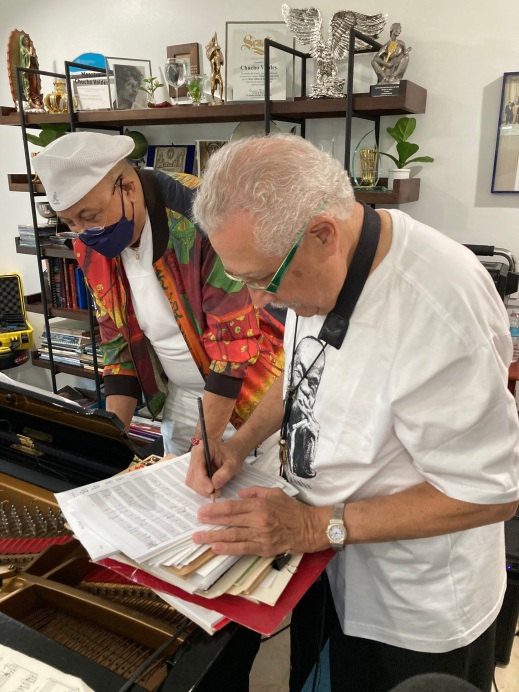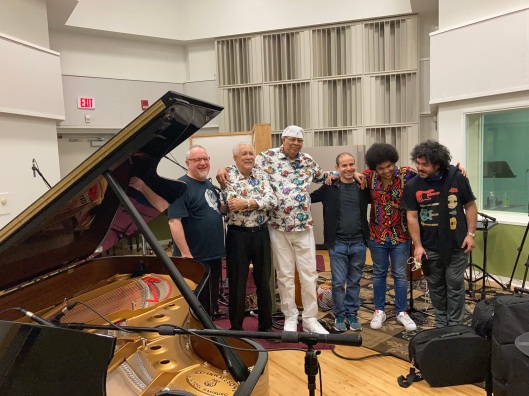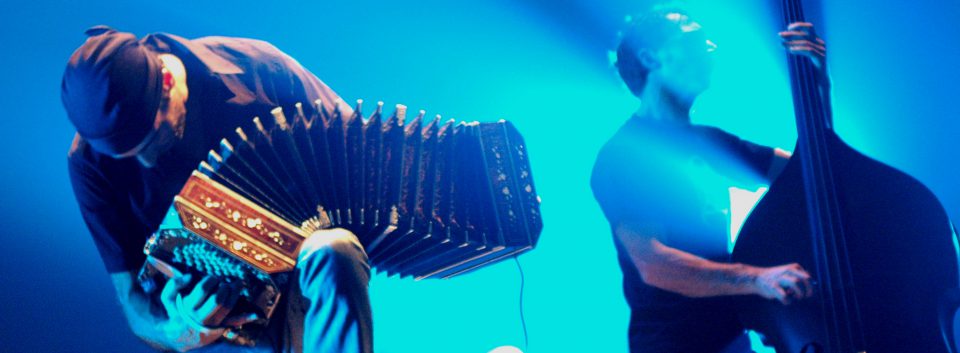
Chucho Valdés and Paquito D’Rivera, working on one more piece for the reunion recording, at Chucho’s home
After 42 years of distance and silences, old friends and bandmates Paquito D’Rivera and Chucho Valdés have reunited, recorded a new album, and are readying to perform together again.
“I’m so proud,” says alto saxophonist, clarinetist and composer D’Rivera in a conversation at Valdés’ house following the final rehearsal for the recording sessions in January. “My life couldn’t end without … ,” he begins, pausing a moment to gather himself. “Chucho,” he continues. “Chucho is part of my life. His father was a close friend of my father. [Our friendship] is something that comes from a long way back. The first song Chucho wrote that became famous was called ‘Indestructible.’ That’s our relationship: indestructible.”
Sitting next to D’Rivera, pianist and composer Valdés nods quietly in agreement. “Today has been one of the happiest days of my life,” he says. “I adored this man, and I’ll always adore him. I missed him. Paquito is part of my life. I believe I played with his father, Tito, a great saxophone player, before I played with him. And Paquito for me is [my father] Bebo, [my mother] Pilar, he’s family, and musically, he’s so important for me. There are many great players, but Paquito is unique.”
D’Rivera was just 13 when he first heard Valdés at a Sunday afternoon jam session in Havana in 1962. Chucho, seven years his senior, was already “a monster pianist,” as Paquito noted in his autobiography My Sax Life (Northwestern). “Here you had this young, black, tall, very skinny guy who played like Oscar Peterson,” he reminisces after the rehearsal. “And I kept thinking, ‘This can’t be. He’s a kid. He can’t be playing like Oscar Peterson.’”
D’Rivera didn’t dare speak to Valdés that afternoon, but he still considers the encounter the beginning of their friendship. Two years later, they were both pit orchestra members at the Teatro Musical de La Habana and shared pre- and after-hours jam sessions. D’Rivera also played on Valdés’ first recording as a leader in 1964. In time, they were both chosen to be part of the all-star Orquesta Cubana de Musica Moderna, which at one point D’Rivera directed and from which, in 1973, emerged Irakere. For the next several decades, the exceptional Afro-Cuban jazz-rock little big band set a high watermark in Latin jazz.
Valdés was the band’s co-founder, pianist, director, principal composer and arranger. D’Rivera was a star in an overwhelming front line that included trumpeters Arturo Sandoval and Jorge Varona and saxophonist Carlos Averhoff.
But while on tour with Irakere in 1980, D’Rivera, who was frustrated with the political situation at home, sought asylum in Madrid, Spain. He eventually made his way to and settled in New York. “Chucho didn’t know,” says D’Rivera. “In places like Cuba, if you love your friend, you don’t tell him everything because it’s better if he doesn’t know … . It was very sad.”
Chucho recalls the scene at the hotel. “Paquito was not around, and someone came and said that Paquito wasn’t going to be with us … , and I didn’t say a word. But when we got to Stockholm, my father, Bebo, had to buy me sunglasses because my eyes were red from crying. Irakere without Paquito? That’s Barcelona without [soccer star Lionel] Messi. There were many good musicians, but Paquito was the heart of Irakere.”
Valdés stayed with the band, but looking for more room for his piano playing, which had taken a back seat to his writing and role as bandleader, launched a parallel career in the 1990s as a solo player and leading small groups. He eventually stepped away from Irakere in 2005.
For the past four decades, their paths have crossed only occasionally. The old friends might have agreed on criticisms and feelings about the political and social situation back in Cuba, but D’Rivera’s outspokenness against the Cuban government, and Valdés’ more reserved, muted approach — and his status as one of the greatest Cuban artists who, at the time, was still at least nominally living on the island — created some awkward situations, silences and distance between them. (Valdés, who spent stretches of time in Málaga, Spain, to be close to his ailing father, Bebo, quietly moved with his family to South Florida in 2010.)
In 2008, Valdés and D’Rivera were each coincidentally booked at the jazz festival in Marciac, France, and the pianist invited his old friend to join him on a performance of a particular favorite of both men — Valdés’ ballad “Claudia.” The affection, and the pleasure of sharing a stage again, are evident in both players. But there were consequences. Valdés was pilloried in some quarters as “a traitor.” “They complained that I had talked to Paquito and had invited him to share the stage. A traitor? A traitor to what?” he says with a shrug.
“I didn’t know that that had happened,” says D’Rivera in a whisper, looking down and then at Valdés.
They appeared together again at the International Jazz Day at the White House in 2016. And when D’Rivera was invited to perform at the Human Rights Foundation’s Oslo Freedom Forum in October 2021 at the New World Center in Miami Beach, he called on Valdés and they appeared as a duo. It was an emotional encounter that set the stage for a reunion. (It also earned Valdés another round of vilification.)
The quiet joy of Valdés and D’Rivera — each having back his old compinche, his partner in crime — set the tone at the rehearsals and the recording. The musicians comprising the ensemble — Diego Urcola on trumpet and valve trombone, Armando Gola on acoustic and electric bass, Dafnis Prieto on drums, and Roberto Vizcaino Jr. on percussion — have been working with Valdés and D’Rivera for a while, some of them for a long time. The sessions were loose and dotted with moments of humor — but also no-nonsense efficient. There were few instructions, and Valdés and D’Rivera seemed to anticipate where the other was going at every turn. Between them, there were glances and sly I-know-what-you-did-there smiles.

From the left: Diego Urcola, trumpet and valve trombone; Paquito, Chucho, Dafnis Prieto, drums; Roberto Vizcaino Jr., percussion, and Armando Gola, acoustic and electric bass, at the end of the recording sessions at University of Miami’s studios.
The repertoire included a couple of Valdés standards (“Mambo Influenciado” and “Claudia”), a Mozart tribute set as a danzón; a duet reading of tango singer Carlos Gardel’s “El Dia Que Me Quieras”; “Paq-Man,” a piece by fellow Cuban pianist Hilario Durán constructed with phrases from various D’Rivera solos; a yet-untitled composition written at the last rehearsal; and D’Rivera’s moving title track, “I Missed You Too.”
“You don’t have to be near a person to feel close,” says D’Rivera, reflecting on the years of separation from Valdés. “Heck, there are people who are married who don’t have such a close relationship. We were born to be close, even while at a distance.”
Valdés nods silently and looks at his old friend. “I’ve always had hope of being close to Paquito again and playing with Paquito again,” he says. “I had that hope all along. Well, here is our time.”
A version of this piece was posted by JAZZIZ.com in February 2022

Two great virtuosos! Have had the pleasure of seeing Paquito play multiple times. Chucho once and Bebo several times. Virtuosos!
Great duo.I get emotional when I hear the music.Nobody else can play like them together.I am Paquito’s brother .We were never close por personal opinions that he had about me but I admire his music talent.It is a gift to hear his music.Nobody can play the sax like him.Nobody else can play the piano like Chucho does.
Dear Enrique, thank you for reading, and for reaching out. I’ve been lucky to know them, and their work, for many years, and, individually, they never cease to amaze me — but together they are something else. Thanks again and please do stay in touch. All the best, Fernando